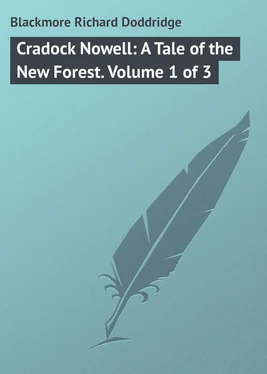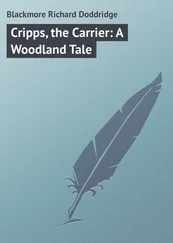Richard Blackmore - Cradock Nowell - A Tale of the New Forest. Volume 1 of 3
Здесь есть возможность читать онлайн «Richard Blackmore - Cradock Nowell - A Tale of the New Forest. Volume 1 of 3» — ознакомительный отрывок электронной книги совершенно бесплатно, а после прочтения отрывка купить полную версию. В некоторых случаях можно слушать аудио, скачать через торрент в формате fb2 и присутствует краткое содержание. Жанр: foreign_prose, на английском языке. Описание произведения, (предисловие) а так же отзывы посетителей доступны на портале библиотеки ЛибКат.
- Название:Cradock Nowell: A Tale of the New Forest. Volume 1 of 3
- Автор:
- Жанр:
- Год:неизвестен
- ISBN:нет данных
- Рейтинг книги:3 / 5. Голосов: 1
-
Избранное:Добавить в избранное
- Отзывы:
-
Ваша оценка:
- 60
- 1
- 2
- 3
- 4
- 5
Cradock Nowell: A Tale of the New Forest. Volume 1 of 3: краткое содержание, описание и аннотация
Предлагаем к чтению аннотацию, описание, краткое содержание или предисловие (зависит от того, что написал сам автор книги «Cradock Nowell: A Tale of the New Forest. Volume 1 of 3»). Если вы не нашли необходимую информацию о книге — напишите в комментариях, мы постараемся отыскать её.
Cradock Nowell: A Tale of the New Forest. Volume 1 of 3 — читать онлайн ознакомительный отрывок
Ниже представлен текст книги, разбитый по страницам. Система сохранения места последней прочитанной страницы, позволяет с удобством читать онлайн бесплатно книгу «Cradock Nowell: A Tale of the New Forest. Volume 1 of 3», без необходимости каждый раз заново искать на чём Вы остановились. Поставьте закладку, и сможете в любой момент перейти на страницу, на которой закончили чтение.
Интервал:
Закладка:
“Why, Master Crad, Iʼm to say a long spill, very sharp at the end”.
“Sharp at the point , Job, not blunt at the end like a new black–lead pencil”.
“And whatever you do, Job, donʼt forget the catgut for my cross–bow, one size larger than last time”.
“Hold your jaw, Viley, till Iʼve quite finished; or heʼll ask for a top made of catgut”.
Both the boys laughed at this; you could hear them all down the long passage. Any small folly makes a boy laugh.
“Well, Master Crad, you must think me a ‘muff’, as you call it. And the groove is to go quite up to the spill; there must be two rings below the crown of it”.
“Below the crown, indeed! On the fat part, I said three times. Now, Viley, you know you heard me”.
“Well, well”, cried Job in despair, “two rings on the fat part, and no knot at all in the wood, and at least six inches round, and, and, well – I think thatʼs all of it, thank the Lord”.
“All of it, indeed! Well, you are a nice fellow! Didnʼt I tell you so, Viley? Why, youʼve left out altogether the most important point of all, Job. The wood must be a clear bright yellow, or else a very rich gold colour, and Iʼm to pay for it next Tuesday, because I spent my weekʼs money yesterday, as soon as ever I got it, and – oh, Viley! canʼt you lend a fellow sixpence”?
“No, not to save my life, sir. Why, Craddy, you know I wouldnʼt let you go tick if I could”.
The boys rushed at one another, half in fun and half in affection, and, seizing each other by the belt of the light–plaid tunic, away they went dancing down the hall, while Hogstaff whistled a polka gently, with his old eyes glistening after them. A prettier pair, or better matched, never set young locks afloating. Each put his healthy, clear, bright face on the shoulder of the other, each flung out his short–socked legs, and pointed his dainty feet. You could see their shapely calves jerked up as they went with double action, and the hollow of the back curved in, as they threw asunder recklessly, then clasped one another again, and you thought they must both reel over. Sir Cradock Nowell hated trousers, and would not have their hair cropped, because it was like their motherʼs; otherwise they would not have looked one quarter so picturesque.
Before the match was fairly finished – for they were used to this sort of thing, and the object always was to see which would give in first – it was cut short most unexpectedly. While they were taking a sharp pirouette down at the end of the hall – and as they whirled round I defy their father to have known the one from the other – the door of the stewardʼs room opened suddenly, and a tall dark woman came out. The twins in full merriment dashed up against her, and must have fallen if she had not collared them with strong and bony arms. Like little gentlemen, as they were, every atom of them, they turned in a moment to apologise, and their cheeks were burning red. They saw a gaunt old woman, wide–shouldered, stern, and forcible.
“Oo, ah! a bonnie pair yeʼve gat, as I see in all my life lang. But yeʼll get no luck o’ them. Takʼ the word o’ threescore year, yeʼll never get no luck o’ them, you that calls yoursel’ Craydock Nowell”.
She was speaking to Sir Cradock, who had followed her from the stewardʼs room, and who seemed as much put out as a proud man of fifty ever cares to show himself. He made no answer, and the two poor children fell back against a side–bench.
“Iʼll no talk o’ matters noo. Youʼve a giʼen me my refoosal, and I tak’ it once for all. But yeʼll be sorry for the day ye did it, Craydock Nowell”.
To the great amazement of Hogstaff, who was more taken aback than any one else, Sir Cradock Nowell, without a word, walked to the wide front door with ceremony, as if he were leading a peeress out. He did not offer his arm to the woman, but neither did he shrink from her; she gathered her dark face up again from its softening glance at the children, and without another word or look, but sweeping her skirt around her, away she walked down the broad front road, as stiff and as stern as the oak–trees.
CHAPTER VI
The lapse of years made little difference with the Reverend John Rosedew, except to mellow and enfranchise the heart so free and rich by nature, and to pile fresh stores of knowledge in the mind so stored already. Of course the parson had his faults. In many a little matter his friends could come down upon him sharply, if minded so to do. But any one so minded would not have been fit to be called John Rosedewʼs friend.
His greatest fault was one which sprang from his own high chivalry. If once he detected a person, whether taught or untaught, in the attempt to deceive or truckle, that person was to him thenceforth a thing to be pitied and prayed for. Large and liberal as his heart was, charitable and even lenient to all other frailties, the presence of a lie in the air was to it as ozone to a test–paper. And then he was always sorry afterwards when he had shown his high disdain. For who could disprove that John Rosedew himself might have been a thorough liar, if trained and taught to consider truth a policeman with his staff drawn?
Another fault John Rosedew had – and I do not tell his foibles (as our friends do) to enjoy them – he gave to his books and their bygone ages much of the time which he ought to have spent abroad in his own little parish. But this could not be attributed to any form of self–indulgence. Much as he liked his books, he liked his flock still better, but never could overcome the idea that they would rather not be bothered. If any one were ailing, if any one were needy, he would throw aside his Theophrastus, and be where he was wanted, with a mild sweet voice and gentle eyes that crannied not, like a craneʼs bill, into the family crocks and dustbin. It was a part, and no unpleasant one, of his natural diffidence, that he required a poor manʼs invitation quite as much as a rich oneʼs, ere ever he crossed the threshold; unless trouble overflowed the impluvium. In all the parish of Nowelhurst there was scarcely a man or a woman who did not rejoice to see the rector pacing his leisurely rounds, carrying his elbows a little out, as men with large deltoid muscles do, wearing his old hat far back on his head, so that it seemed to slope away from him, and smiling quietly to himself at the children who tugged his coat–tails for an orange or a halfpenny. He never could come out but what the urchins of the village were down upon him as promptly as if he were apple–pie; and many of them had the impudence to call him “Uncle John” before his hair was grey.
Instead of going to school, the boys were apprenticed to him in the classics; and still more pleasantly he taught them to swim, and fish, and row. Of riding he knew but little, except from the treatise of Xenophon, and a paper on the Pelethronian Lapiths; so they learned it as all other boys do, by dint of crown and hard bumpage. Moreover, Mark Stote, head gamekeeper, took them in hand very early as his pupils in woodcraft and gunnery. To tell the truth, Uncle John objected to this accomplishment; he thought that the wholesome excitement and exercise of shooting afforded scarcely a valid reason for the destruction of innocent life. However, he recollected that he had not always thought so – his conversion having been wrought by the shrieks of a wounded hare – neither did he expect to bind all the world with his own girdle. Sir Cradock insisted that the young idea should be taught to shoot, and both the young ideas took to it very kindly.
Perhaps on the whole they were none the worse for the want of public–school training. What they lost thereby in quickness, suspicion, and effrontery, was more than balanced by the gain in purity, simplicity, love of home, and kindliness. For nature had not gifted them with that vulgar arrogance, for which the best prescription is “calcitration nine times a day, and clean the boots for kicking you”. Every year their father took them for a month or two to London, to garnish with some courtly frilling the knuckles of his Hampshire hams. But they only hated it; thorough agricoles they were, and well knew their own blessings: and sweet and gladsome was the morning after each return, though it might be blowing a gale of wind, or drizzling through the ash–leaves. And then the headlong rush to see beloved Uncle John. Nature they loved in any form, sylvan, agrarian, human, when that human form was such as they could climb and nestle in. And there was not in the parish, nor in all the forest, any child so rough and dirty, so shock–headed, and such a scamp, that it could not climb into the arms of John Rosedewʼs fellow–feeling.
Читать дальшеИнтервал:
Закладка:
Похожие книги на «Cradock Nowell: A Tale of the New Forest. Volume 1 of 3»
Представляем Вашему вниманию похожие книги на «Cradock Nowell: A Tale of the New Forest. Volume 1 of 3» списком для выбора. Мы отобрали схожую по названию и смыслу литературу в надежде предоставить читателям больше вариантов отыскать новые, интересные, ещё непрочитанные произведения.
Обсуждение, отзывы о книге «Cradock Nowell: A Tale of the New Forest. Volume 1 of 3» и просто собственные мнения читателей. Оставьте ваши комментарии, напишите, что Вы думаете о произведении, его смысле или главных героях. Укажите что конкретно понравилось, а что нет, и почему Вы так считаете.












